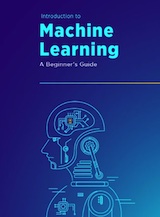
|
FreeComputerBooks.com
Links to Free Computer, Mathematics, Technical Books all over the World
|
|
- Title: The Mechanics of Machine Learning
- Author(s) Terence Parr and Jeremy Howard
- Publisher: explained.ai
- Paperback: N/A
- eBook: HTML and PDF
- Language: English
- ISBN-10: N/A
- ISBN-13: N/A
- Share This:

|
This book is a primer on machine learning for programmers trying to get up to speed quickly. You'll learn how machine learning works and how to apply it in practice. It focuses on just a few powerful models (algorithms) that are extremely effective on real problems, rather than presenting a broad survey of machine learning algorithms as many books do.
About the Authors- N/A
- Machine Learning
- Neural Networks and Deep Learning
- Artificial Intelligence
- Data Analysis and Data Mining
- From Scratch
 Similar Books:
Similar Books:
-
 Approaching (Almost) Any Machine Learning Problem
Approaching (Almost) Any Machine Learning Problem
This book is for people who have some theoretical knowledge of machine learning and deep learning and want to dive into applied machine learning. The book is best enjoyed with a cup of coffee and a laptop/workstation where you can code along.
-
 Pen and Paper Exercises in Machine Learning (Michael Gutmann)
Pen and Paper Exercises in Machine Learning (Michael Gutmann)
This is a collection of (mostly) pen-and-paper exercises in machine learning. The author assumes basic calculus, linear algebra, probability and statistics but no prior exposure to machine learning.
-
 Foundations of Machine Learning (Mehryar Mohri, et al)
Foundations of Machine Learning (Mehryar Mohri, et al)
This book is a general introduction to machine learning. It covers fundamental modern topics in machine learning while providing the theoretical basis and conceptual tools needed for the discussion and justification of algorithms.
-
 The Hundred-Page Machine Learning Book (Andriy Burkov)
The Hundred-Page Machine Learning Book (Andriy Burkov)
Everything you really need to know in Machine Learning in a hundred pages! This book provides a great practical guide to get started and execute on ML within a few days without necessarily knowing much about ML apriori.
-
 Machine Learning Yearning (Andrew Ng)
Machine Learning Yearning (Andrew Ng)
You will learn how to align on ML strategies in a team setting, as well as how to set up development (dev) sets and test sets. After finishing this book, you will have a deep understanding of how to set technical direction for a machine learning project.
-
 Machine Learning Engineering (Andriy Burkov)
Machine Learning Engineering (Andriy Burkov)
The most complete applied AI book out there. It is filled with best practices and design patterns of building reliable machine learning solutions that scale. It embraces the most important thing you need to know about machine learning: mistakes are possible.
-
 Reinforcement Learning: An Introduction, Second Edition
Reinforcement Learning: An Introduction, Second Edition
It provides a clear and simple account of the key ideas and algorithms of reinforcement learning that is accessible to readers in all the related disciplines. Focuses on core online learning algorithms, with the more mathematical material set off in shaded boxes.
-
 Interpretable Machine Learning: Black Box Models Explainable
Interpretable Machine Learning: Black Box Models Explainable
This book explains to you how to make (supervised) machine learning models interpretable. The book focuses on machine learning models for tabular data (also called relational or structured data) and less on computer vision and NLP tasks.
-
 The Big Book of Machine Learning Use Cases
The Big Book of Machine Learning Use Cases
This how-to reference guide provides everything you need - including code samples and notebooks - to start putting Machine Learning to work. It's a collection of technical blogs from industry thought leaders with practical use cases you can leverage today.
-
 Probabilistic Machine Learning: An Introduction (Kevin Murphy)
Probabilistic Machine Learning: An Introduction (Kevin Murphy)
This book is a comprehensive introduction to machine learning that uses probabilistic models and inference as a unifying approach. It is written in an informal, accessible style, complete with pseudo-code for the most important algorithms.
-
 Pattern Recognition and Machine Learning (Christopher Bishop)
Pattern Recognition and Machine Learning (Christopher Bishop)
This is the first textbook on pattern recognition to present the Bayesian viewpoint. The book presents approximate inference algorithms that permit fast approximate answers in situations where exact answers are not feasible.
-
 Gaussian Processes for Machine Learning (Carl E. Rasmussen)
Gaussian Processes for Machine Learning (Carl E. Rasmussen)
This book provides a long-needed systematic and unified treatment of theoretical and practical aspects of Gaussian Processes (GPs) in machine learning. It deals with the supervised-learning problem for both regression and classification.
-
 Dive into Deep Learning (Aston Zhang, et al.)
Dive into Deep Learning (Aston Zhang, et al.)
This is an open source, interactive book provided in a unique form factor that integrates text, mathematics and code, now supports the TensorFlow, PyTorch, and Apache MXNet programming frameworks, drafted entirely through Jupyter notebooks.
-
 Deep Learning for Coders with Fastai and PyTorch
Deep Learning for Coders with Fastai and PyTorch
This book show you how to train a model on a wide range of tasks using fastai and PyTorch. You'll also dive progressively further into deep learning theory to gain a complete understanding of the algorithms behind the scenes.
-
 Deep Learning (Ian Goodfellow, et al)
Deep Learning (Ian Goodfellow, et al)
Written by three experts, this is the only comprehensive book on the subject. It offers mathematical and conceptual background, covering relevant concepts in linear algebra, probability theory and information theory, numerical computation, and machine learning.





